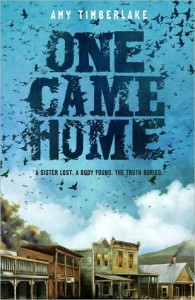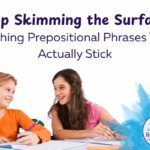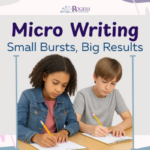 This month I was hired to do the best job imaginable, model a Readers’ Workshop. At the end of March I took a whole cart of great fiction (mostly off the Lone Star Reading List) into 6 different sixth grade classrooms, with the one goal of hooking kids on a book.
This month I was hired to do the best job imaginable, model a Readers’ Workshop. At the end of March I took a whole cart of great fiction (mostly off the Lone Star Reading List) into 6 different sixth grade classrooms, with the one goal of hooking kids on a book.
I prepared a mini-lesson on how to choose a book and make a prediction based off of the teaser on the back, the title, and picture. I used One Came Home by Amy Timberlake as my model, then students chose their own book. Similar to probably any classroom, some students quickly grabbed a book, others were not as enthusiastic. Some mutterings of “I don’t like reading” and other similar comments were overheard. I approached as many of those kids as possible and with enthusiasm I discussed some of the books that I had brought.
Once every student had a book, they too made predictions. I then modeled, using One Came Home, how to make inferences about what the character is thinking or feeling based on their actions. Using a simple gradual release model, the students began working with me to make powerful inferences using text evidence. It was obvious that the students were engaged in the book I was reading. Then I did something horribly mean – I stopped reading my book! Those are the most beautiful groans in an ELA/R classroom, the “we’re not going to be reading more” groans. Then I told them that they would be reading their own book for the rest of the class period. Their challenge was to focus on what the characters were doing and what inferences could be made about their feelings or personality based on their actions.
A total of nine classrooms in three days, and not one student complained about reading. Five minutes before the end of class, the students were asked to write an exit ticket. On their ticket, they were to write 2-3 sentences on how their character was feeling and how they knew (text evidence). Again, not one complaint and all students were compliant! Many students took post-it notes from me to write down the title and author of their book so they could find it in the library. Quite a few students who initially said they didn’t care for reading let me know that the book they had was good and they might read some more. I left that week so excited and ready to return a couple of weeks later. When I returned, so many students came running towards me when they saw me. They reached into their backpacks and produced books they were reading to share with me how great they are. No doubt, this is the best part of teaching, the exuding enthusiasm the students have when they realize they love learning.
I can’t wait to return in a few more weeks! Dare I say, I will bring poetry to class???
For a book review and lesson integration ideas for One Came Home – http://www.literaryfusions.com/2014/03/25/book-review-one-came-home-by-amy-timberlake/


